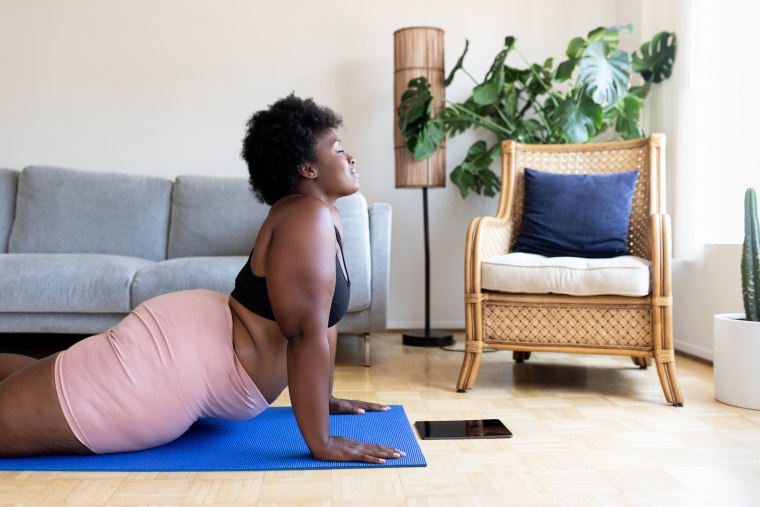Life can be hard. Being tough on yourself can make it even harder.
Though many of us excel at being our own harshest critics, loving, embracing and accepting ourselves — flaws and all — is the key to living a happier, healthier life.
“Self-love is a verb, not a noun. Think of self-love as a compass that directs behaviors and actions towards yourself and what you need in each changing moment and situation,” Dr. Sabrina Romanoff, a licensed psychologist in New York City, told TODAY.
Since self-love encompasses the "acceptance of personal flaws and the lifelong pursuit of personal growth," Emily Simonian, LMFT and head of clinical learning at Thriveworks, a nationwide mental health company, says it may be more aptly called self-compassion or self-balance.
Whatever you call it, truly loving yourself isn't easy because, as Romanoff says, many people close off their own emotions, vulnerability, and behaviors to shield themselves from pain. “It is easier to view oneself from the outside looking in, in terms of what others may think of you and how you deem your worth based on what you provide to others and their reaction to you,” she said, noting that there is a perspective shift when a person begins to prioritize internal needs above those of others.
Even so, loving yourself wholly and compassionately is within reach — and incredibly important for your emotional and mental health.
Self-love "simultaneously prevents you from being too hard on yourself while also motivating acts of self-betterment," Simonian said. "The absence of self-love altogether leads to a harsh view of oneself, prompting thoughts and feelings like guilt or disapproval which can contribute to mental health issues such as anxiety or depression."
Ultimately, the love you have for yourself translates to others. “The axiom of self-love is you need to provide for yourself before you can love others — just like the old cliché of putting your own airbag on first before helping others," Romanoff said.
No matter where you are in your self-love journey, there's always room for improvement. Whether you want to be happier on your own, be a better friend or partner, or simply stop being so hard on yourself, here are expert-approved strategies on how to love yourself — for real.
Quiet your inner critic
Easier said than done, we know. But it’s one of the biggest steps you can take to improve the quality of your life.
“If your inner dialogue is dominated by a loud critical voice then it will be hard to love and accept yourself as fully as you could,” David Klow, LMFT, founder of Skylight Counseling Center in Chicago and author of "Inspiration For The Weary Therapist: A Practical Clinical Companion," told TODAY. “Rather than judging or beating yourself up for being human, if you develop a practice of being gentle with your own thoughts and feelings then you are more capable of being kind and gentle with others.”
If a negative thought about yourself surfaces, try to separate fact from fiction. Start by writing down three things that counteract the critical thought to squash it once and for all.
"When critical voices arise in our heads, we can simply observe them and through mindfulness begin to distinguish and distance ourselves from these thoughts versus trying to push them away," Blessing Uchendu, LCSW, owner of Freshwater Counseling & Consulting, told TODAY.
Take yourself on dates
“We love ourselves by forming a relationship with ourselves,” Uchendu said. When getting to know someone, either romantically or platonically, we take their feelings into account and make sure that “the things that matter to them, matter to us.” We don't, however, extend that same courtesy to ourselves.
Uchendu recommends carving out uninterrupted time to do things that that bring us joy, and protect this time as we would if we were meeting with another person. “For those who did not receive sufficient emotional care when growing up, this process can involve reparenting your inner child,” she said. “This is simply about attending to and honoring the younger, more emotional parts of ourselves that weren’t witnessed when we were young, and now as adults, we have the ability to provide what we didn’t receive.”
Related: Fun date ideas (even if you're flying solo)
Slow down
During this time of growth, set aside time to rest and recharge. Uchendu suggests viewing yourself as "a human being, not simply a ‘human doing.’"
"While being productive is helpful and a necessary part of leading a fulfilling life, pushing oneself constantly to do better and be better is antithetical to loving oneself,” she said. Create designated time for embracing a slower pace by taking lunch breaks, developing hobbies and daydreaming.

Practice gratitude
An attitude of gratitude can do wonders. “Remember to shift attentional resources from all that you lack or are not to all that you are able to do and are skilled at,” Romanoff said. “Fall in love with the life you created for yourself and the person you’ve worked so hard to become.”
Even better, researchers are finding that embracing gratitude can have an impact on your physical health, too. “Clinical trials indicate that the practice of gratitude can have dramatic and lasting effects in a person’s life,” Robert A. Emmons, professor of psychology at UC Davis, previously told TODAY. “It can lower blood pressure, improve immune function and facilitate more efficient sleep.”
Try dialectical thinking
According to Simonian, dialectical thinking is “seeing things from multiple perspectives, to improve your sense of psychological balance."
Really, it's all in the words. Use the word “and” to join two opposing thoughts or feelings you have. Some examples: “I don’t always love the way my body looks and I know I can also accept myself as I am” or “my son struggles in school and that doesn’t mean I’m a bad parent."
“This practice will help you move away from the idea that there is only one truth and instead accept that there are many subjective truths," Simonian said. Over time, this will create a deep sense of self-acceptance.
Seek out a licensed therapist
While you can always turn to friends and family for guidance, therapists are a neutral, supportive party. “Therapists do not hold the same bias that you bring to your own experiences and perceptions," Romanoff said. You may even hear words from a therapist more clearly given the professional nature of your relationship.
“Folks often do not realize the extent to which they have internalized criticism and how it results in ingrained self-beliefs and automatic thoughts of denigration. Therapists can bring these programmed and often unconscious beliefs to the surface,” she said.
Related: How to find the right therapist for you
Stop idealizing others
It's time to stop putting other people on a pedestal. An easy solve: Limit or nix social media usage. “Remember that social media is an extreme version of the public persona or mask folks project, but only represents a sliver of the challenges, problems and difficulties that color individuals’ lives," Romanoff said.
In your own life, it’s easy to focus on the bad rather than celebrate the good. As a general rule, Romanoff said you shouldn’t let yourself be defined by your problems. “Rather, it is the evaluations about those problems and how they are dealt with that holds the key to self-love and overall functioning."
Live as if you love yourself every day
Keep this notion from Simonian in your back pocket. “If you engage in one act of self-compassion daily, the results will be significant over time," she said. To do this, she recommends asking yourself how you normally show love to others: "Is it through positive words, for example? Then apply that to yourself. Maybe that means writing yourself a brief positive note every day."
While you're at it, Simonian recommends focusing on giving what you really want or need “because so often we deprive ourselves of those things out of guilt or because of rigid thinking.” For instance, let yourself enjoy dessert guilt-free or ask others for help without worrying about being a burden.
Create clear boundaries
Establishing boundaries is one of the most valuable acts of self-care, but it varies from individual to individual.
“Boundaries might look like keeping some distance between you and a family member who is toxic and not allowing yourself to be guilt-tripped into spending time with them. Boundaries might also involve being clear with your limitations and not overcommitting as a way of expressing love towards yourself," Uchendu said.
Naturally, people are socialized to believe that their worth is in what they provide to others — even at the expense of themselves. “It is pretty revolutionary then, when as an act of love for themselves, someone might say ‘no’ to a request in order to honor their own need for rest,” she said.

Own where you are
Remember: There’s only one you, which is why it's important to embrace yourself in your current state and not harp on your shortcomings. “If you are able to love and accept yourself, in all your humanness, inconsistency, and awkwardness, then you are more capable of loving and accepting others. It can be difficult to truly accept others when we judge and criticize ourselves,” Klow said.
Self-love is a subconscious thought before it even becomes a feeling, and feelings drive behavior. For that reason, Simonian recommends limiting thoughts that don’t contribute to grace, acceptance, or personal growth. “You first have to become aware of limiting thoughts, which are usually comparative, critical or apathetic toward yourself,” she said. Once you’re aware of these types of thoughts, Simonian urges individuals to find evidence that disproves their validity. Some examples of altered language include: “I have received feedback that I’m good at work presentations” versus "I'm not good at work presentations."
Label your emotions
Consider this a corollary to the above rule of thumb. “Acknowledge and validate your emotions, even the inconvenient or troublesome ones,” Romanoff said. “Each of your emotional reactions are valid and hold an important function by alerting you to what is needed."
Mindfulness and self-acceptance go hand in hand, according to Romanoff. It may be helpful to establish a daily meditation practice, even if it’s only for four minutes a day. Try apps like Simple Habit or Headspace, which can help hold you accountable and keep you engaged in making meditation part of your regular routine.










